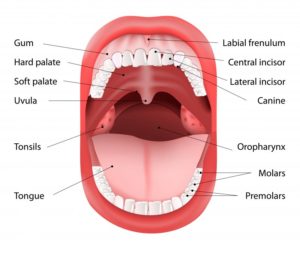
When you understand how something works and the parts that make it up, you tend to have a better appreciation for it. A good example is people who love cars. Sure, some of them strictly love to drive but most understand all the parts of the car, how the engine works, etc.
This concept carries over to your mouth and oral hygiene. When you realize that your mouth is more than just a set of teeth and a tongue, and you understand the purpose of the various parts, it is more likely you’ll see the value in maintaining your overall oral health. Don’t forget those teeth though.
Keep reading to learn about the components of your mouth from your dentist in Columbia.
What Are My Temporomandibular Joints Used For?
Why not start with parts of the mouth that are not especially well-known? Your two temporomandibular joints facilitate your ability to chew, speak, and swallow. They also enable your mouth to open and close, as well as allow you to move your lower jaw forward and side to side.
These joints are located on both sides of your head near your ears and work together with your jawbone, facial muscles, and ligaments. Any disruption to the synchronization of this pair, which can happen if you grind your teeth at night, can result in facial pain, difficulty in chewing, and jaw stiffness.
How Are My Teeth Helped by My Tongue, Lips, and Cheeks?
The tongue is a powerful muscle that facilitates chewing, swallowing, speaking, and tasting food. Taste buds, sensory receptors on your tongue, enable you to enjoy the food you eat. In fact, the human tongue can have up to 10,000 taste buds, which help you detect sweet, salty, bitter, and savory flavors.
The pressure the tongue applies within the mouth helps the oral cavity maintain its shape and keeps the teeth properly positioned.
Your lips and cheeks contribute to everything from forming your facial expressions to breathing and speaking. They also keep food and saliva in your mouth while you chew. These strong muscles brace your teeth to keep them in the proper position.
How Do I Benefit from My Salivary Glands, Gums, and Alveolar Bone?
You have six salivary glands that produce the clear liquid known as saliva, which is made up predominantly of water and contains substances that break down food to begin the digestive process. Saliva also moistens your mouth to help with speaking, chewing, and swallowing.
Plus, it washes bacteria from your teeth and gums. The proteins and minerals in saliva play a vital role in protecting the enamel, as well.
Your mouth’s gum tissue holds your teeth in place and protects the roots from decay. You may be familiar with gum disease, and the main symptoms include swelling and chronic bleeding. These warning signs are important because unchecked gum disease can lead to tooth and bone loss.
On the other hand, the alveolar bone is not a well-known portion of the mouth. The roots of your teeth anchor them in your jawbone. The alveolar bone surrounds the roots to stabilize the teeth.
Definitely continue to take excellent care of your teeth, but sometimes it is important to highlight other parts of the mouth. Rinse with an antimicrobial mouthwash, brush your tongue and your gums, and visit your dentist twice each year so they can check your entire mouth for signs of disease in addition to providing the thorough cleaning that is essential to your oral health.
About the Author
Dr. Philip Batson earned his dental doctorate from the University of Missouri-Kansas City. He and his wife, Dr. Elizabeth Abe, value continuing a family tradition of providing quality oral healthcare for the citizens of Central Missouri which began 40 years ago with his father. Dr. Batson is a member of the American Dental Association. If you have a question about a part of the mouth that you learned more about in this blog, he will be happy to answer it for you during your next dental cleaning and exam. To schedule an appointment, visit his website or call (573) 875-7071.
